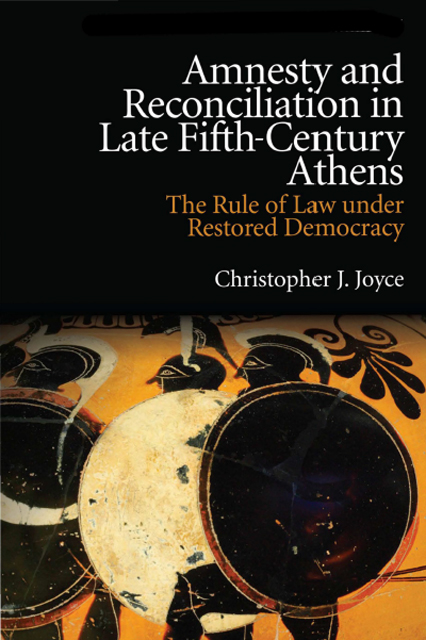Book contents
- Frontmatter
- Contents
- Preface and Acknowledgements
- List of Abbreviations
- 1 Introduction: The Athenian Reconciliation in Modern Scholarship
- 2 Civil Strife at Athens, 404–403
- 3 Oaths and Covenants
- 4 The Legal Scrutiny and the Resurrection of the Rule of Law
- 5 The Amnesty Applied (I): The Trials of Agoratus and Eratosthenes
- 6 The Amnesty Applied (II): The Trials of Callimachus and Socrates
- 7 The Athenian Reconciliation as the Paradigm for the Greek World in the Classical and Hellenistic Ages
- 8 The Rule of Law Restored: The Legacy of the Reconciliation in the Fourth Century
- Bibliography
- Index Locorum
- Subject Index
6 - The Amnesty Applied (II): The Trials of Callimachus and Socrates
Published online by Cambridge University Press: 03 June 2023
- Frontmatter
- Contents
- Preface and Acknowledgements
- List of Abbreviations
- 1 Introduction: The Athenian Reconciliation in Modern Scholarship
- 2 Civil Strife at Athens, 404–403
- 3 Oaths and Covenants
- 4 The Legal Scrutiny and the Resurrection of the Rule of Law
- 5 The Amnesty Applied (I): The Trials of Agoratus and Eratosthenes
- 6 The Amnesty Applied (II): The Trials of Callimachus and Socrates
- 7 The Athenian Reconciliation as the Paradigm for the Greek World in the Classical and Hellenistic Ages
- 8 The Rule of Law Restored: The Legacy of the Reconciliation in the Fourth Century
- Bibliography
- Index Locorum
- Subject Index
Summary
The cases discussed in Chapter 5 against Agoratus and Eratosthenes illustrate the effectiveness of the Amnesty to block litigation which recalled wrongs committed under the Thirty. The first of these, the trial of Agoratus, at first sight seems to have violated the rule μὴ μνησικακεῖν which blocked frivolous litigation against those who were not among the Thirty, Ten or Eleven. Though a close conspirator and confidante of the Thirty, Agoratus had not sat on any of the boards whose members were exempted under covenant 16 (see Chapter 3). Though scholars have sought routes around this, none of the suggestions made to date pass muster. The closest suggestion to the truth that has been advanced to date is that though the Amnesty did put legal measures in place to prevent trials of this kind from happening, in the wake of the ousted oligarchy, restored citizens, despite their oaths, harboured such anger that they engaged in court litigation which was strictly illegal under the terms of the covenants. But even that is to miss a deeper point: the trial of Agoratus is evidence not of the ineffectiveness of the Reconciliation but, on the contrary, of its enormous and widespread efficacy. If the trial was inadmissible, there was nevertheless a legal grey area over whether crimes which had had such enormous significance in bringing down democracy in 404 could be relegated into same bracket of the exception made in the Amnesty clauses for the Thirty, Ten and Eleven, even if the person who committed them was not a member of any of those boards. The speech has survived in the record precisely because it exemplifies the enormous efforts litigators had to canvass in order to argue their way around the rule which specified that untried cases predating 403, whether relating to the period of oligarchy or even before, were now inadmissible. The speaker of Lys. 13 alludes to the Amnesty in anticipation that the defendant would cite it, and in that expectation presents a skewed interpretation of the Amnesty clause μὴ μνησικακεῖν which the defence would have found easy to refute. The trial of Eratosthenes, in contrast, was admissible because the defendant had sat on the board of the Thirty.
- Type
- Chapter
- Information
- Amnesty and Reconciliation in Late Fifth-Century AthensThe Rule of Law under Restored Democracy, pp. 158 - 179Publisher: Edinburgh University PressPrint publication year: 2022

